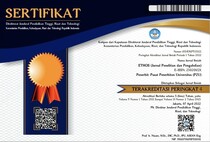Sustainable Urban Space Development based on The Needs of Urban Communities : Case Study Bandung Raid Party
DOI:
https://doi.org/10.29313/ethos.v13i1.4061Keywords:
Urban Community, Sustainable Development, Community Based Planning, Pokemon Go, Urban SpacesAbstract
Sustainable urban spaces are the right of every urban dweller. As an eminent user of urban spaces, the preferences of citizens need to be considered in developing an urban environment. Urban dweller preferences include various aspects, which include their favourite activities and hobbies. Citizen’s favourite activities and hobbies are commonly accommodated by establishing urban communities. Consequently, these communities should be able to provide recommendations for ensuring effective and efficient sustainable development. This study aims to formalize the connection between reasonable development based on urban community activities. Bandung Raid Party was the urban community elected for this study in consideration of their direct interaction with urban spaces, their members coming from various backgrounds, and their ripe age in comparison with other similar communities. Key data and information are gathered through literature study and structured interviews with strategic actors from the community, which are later analyzed using content analysis. After comprehensive analysis and consideration, the research shows how the Bandung Raid Party community observes and appreciates the quality of urban spaces where they hold their activities. The study also shows that their activities can be supported by developing and improving sustainable pedestrian access, public spaces, and urban iconic landmarks. These findings can be initial evidence of how urban communities can provide significant input for sustainable urban development.
References
Ahmad Gozali, Tarlani, & Ernawati. (2023). Peluang yang Dapat Diraih oleh Desa Patimban dari Pembangunan Pelabuhan Patimban. Jurnal Riset Perencanaan Wilayah dan Kota, 65–74. https://doi.org/10.29313/jrpwk.v3i1.1963
Ahmad Zaky Rahman. (2024, January 6). Wawancara dengan Pak Zaky Selaku Admin Bandung Raid Party Berlatar Belakang Pendidikan Perencanaan Wilayah Dan Kota.
Aji, R. R. & Faniza, V. (2022). Kepuasan Berbasis Kebutuhan dan Penilaian Pengunjung Taman Alun-Alun Pacitan. ETHOS, Jurnal Penelitian dan Pengabdian Kepada Masyarakat, 10 (2), 197-211
Al-Kodmany, K. (2001). Bridging The Gap Between Technical and Local Knowledge: Tools For Promoting Community-Based Planning and Design. Journal of Architectural and Planning Research, 18 (2), 110–130.
Alomar, N., Alsaleh, M. & Alarifi, A. (2009). Behavioral Consequences of Pokemon GO: The Exaggerated Picture, Computers in Human Behaviour, 90, 223-245
Aztamurri, F. I., & Indratno, I. (2022). Identifikasi Ekosistem Usaha Mikro, Kecil dan Menengah (UMKM) sebagai Pendukung Desa Wisata Rawabogo, Kecamatan Ciwidey, Kabupaten Bandung. Jurnal Riset Perencanaan Wilayah dan Kota, 1(2), 175–183. https://doi.org/10.29313/jrpwk.v1i2.482
Aveyard, H. (2010). Doing a Literature Review in Health and Social Care: a Practical Guide (2nd ed.). Berkshire, Great Britain: Open University Press.
Banks, N. & Hulme, D. (2014). New Development Alternatives or Business as Usual with a New Face? The Transformative Potential of New Actors and Alliances in Development. New Actors and Alliances in Development, 1st Edition, Routledge.
Bryman, A. & Bell, E. (2007). Business Research Methods. Oxford University Press, USA
Checkoway, B., Pothukuchi, K. & Finn, J. (1995). Youth Participation in Community Planning: What are the Benefits? Journal of Planning Education and Research, 14(2), 134-139
Farr, D. (2008). Sustainable Urbanism - Urban Design with Nature. Hoboken, New Jersey, United States of America: John Wiley & Sons, Inc.
Grengs, J. (2002). Community-Based Planning as a Source of Political Change: The Transit Equity Movement of Los Angeles’ Bus Riders Union. Journal of the American Planning Association, 68(2), 165-178
Green, L. W., & Mercer, S. L. (2001). Can Public Health Researchers and Agencies Reconcile the Push From Funding Bodies and the Pull From Communities? American Journal of Public Health, 91(12), 1926–1929. https://doi.org/10.2105/AJPH.91.12.1926
Hibbard, M. & Lurie, S. (2000). Saving Land but Losing Ground – Challenges to Community Planning in the Era of Participation. Journal of Planning Education and Research, 20, 187-195
Indratno, I, Chamid, C., Judiantono, T., Syam, H., Al-Zyanasya, S., Sonya, V. M., Yuniar, N. & Zulfikar, M. D. (2023). Village Asset Mapping for the Development of Rawabogo Tourism Village. ETHOS, Jurnal Penelitian dan Pengabdian Kepada Masyarakat, 11 (1), 20-26
Innes, J. (1998). Challenge and Creativity in Postmodern Planning. Town Planning Review, 69(2), v-ix
Irawan, C. D. (2024, 2 Januari). Wawancara Pengembangan Ruang Perkotaan Berbasis Kebutuhan Komunitas Perkotaan dengan Ketua Komunitas Pertama
Jones, P. (2016). Unpacking Informal Urbanism: Urban Planning and Design Education in Practice. Bandung, Indonesia: Penerbit Institut Teknologi Bandung.
Kemp, C., Pienaar, P. R., Rosslee, D. T., Lipinska, G., Roden, L. C., & Rae, D. E. (2021). Sleep in Habitual Adult Video Gamers: A Systematic Review. Frontiers in Neuroscience, 15, 781351. https://doi.org/10.3389/fnins.2021.781351
Lee, J. E., Zeng, N., Oh, Y., Lee, D., & Gao, Z. (2021). Effects of Pokémon GO on Physical Activity and Psychological and Social Outcomes: A Systematic Review. Journal of Clinical Medicine, 10(9), 1860. https://doi.org/10.3390/jcm10091860
Latham, A. & Layton, J. (2019). Social Infrastructure and the Public Life of Cities: Studying Urban Sociality and Publix Spaces. Geography Compass, e124444
Madanipour, A. (1999). Why are the Design and Development of Public Spaces Significant for Cities? Environment and Planning B: Planning and Design, 26 (6), 879-891
Megantara, E. N., Husodo, T., Kendarto, D. R., Mutaqin, A. Z., Shanida, S. S., & Wulandari, I. (2024). Community's Knowledge of Leopard Cats'Roles in the Cisokan, West Java. ETHOS, Jurnal Penelitian dan Pengabdian Kepada Masyarakat, (12 (1), 1-8/
Menteri Pekerjaan Umum Republik Indonesia (2006). Peraturan Menteri Pekerjaan Umum Nomor 30/PRT/M/2006 tentang Pedoman Teknis Fasilitas dan Aksesibilitas pada Bangunan Gedung dan Lingkungan.
Morgenroth, T., Stratemeyer, M., & Paaßen, B. (2020). The Gendered Nature and Malleability of Gamer Stereotypes. Cyberpsychology, Behavior, and Social Networking, 23(8), 557–561. https://doi.org/10.1089/cyber.2019.0577
Neely, E. L. (2018). Augmented Reality, Augmented Ethics: Who Has The Right to a Particular Physical Space?. Ethica and Information Technology, 21, 11-18
Oleksy, T. & Wnuk, A. (2017). Catch Them All and Increase Your Place Attachment! The Role of Location-Based Augmenter Reality Games in Changing People-Place Relations. Computers in Human Behaviour, 76, 3-8
Paay, J., Kjeldskov, J., Internicola, D. & Thomasen, M. (2018). Motivations and Practices for Cheating in Pokémon GO. Understanding Mobile Use, MobileHCI’18, 35, 1-13
Pattisinai, A. R., Nadiar, F., Nusantara, D. A. D. (2020). Exploring Pedestrian Ways Quality for Better Urban Place: Necessary, Optional, and Social Activity. Journal of Physics: Conference Series. 1569 042020
Palaguna, A. T. (2024, 6 Januari). Wawancara Pengembangan Ruang Perkotaan Berbasis Kebutuhan Komunitas Perkotaan dengan Ketua Komunitas Kedua
Paaßen, B., Morgenroth, T., & Stratemeyer, M. (2017). What is a True Gamer? The Male Gamer Stereotype and the Marginalization of Women in Video Game Culture. Sex Roles, 76(7–8), 421–435. https://doi.org/10.1007/s11199-016-0678-y
Peraturan Pemerintah Pengganti Undang-Undang Republik Indonesia Nomor 2 Tahun 2022 Tentang Cipta Kerja, 22 (2022).
Pingkardi, K. C. (2024, 6 Januari). Wawancara Pengembangan Ruang Perkotaan Berbasis Kebutuhan Komunitas Perkotaan dengan Ketua Komunitas Ketiga.
Radcliffe, S. A. (2015). Development Alternatives. Development and Change, 46(4), 855-874.
Rahman, A. Z. (2024, 6 Januari). Wawancara Pengembangan Ruang Perkotaan Berbasis Kebutuhan Komunitas Perkotaan dengan Anggota Komunitas Berlatarbelakang Akademik Perencanaan Wilayah dan Kota
Selman, P. (2004). Community Participation in the Planning and Management of Cultural Landscapes. Journal of Environmental Planning and Management, 47(3), 365-392
Shandas, V. & Messer, W. B. (2008). Fostering Green Communities Through Civic Engagement: Community-Based Environmental Stewardship in the Portland Area. Journal of the American Planning Association, 74(4), 408-418
Suminar, L., Astuti, W., Sunjaya, N. I., Kusumaputri, N., Margareta, L. A., & Pamungkas, B. P. (2024). Local Wisdom in Housing and Settlement Planning: A Case Study of Sudiroprajan Chinatown, Surakarta. ETHOS, Jurnal Penelitian dan Pengabdian Kepada Masyarakat, 12(2), 71-80.
Tarlani, Atih Rohaeti Dariah, & Asni Mustika Rani. (2022). Transforming Rural Economy Through Community-Based Tourism with Village-Owned Enterprise (BUMDES, Badan Usaha Milik Desa)—A Case Study: Cibiru Wetan, Pagerwangi and Cipamekar Villages, Indonesia. International Journal of Sustainable Development and Planning, 17(5).
Downloads
Published
How to Cite
Issue
Section
License
Copyright (c) 2024 Rama Arianto Widagdo, Muhammad Fakhriza

This work is licensed under a Creative Commons Attribution-NonCommercial-ShareAlike 4.0 International License.


















